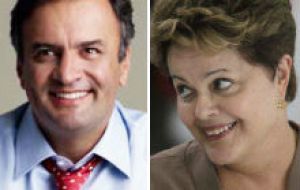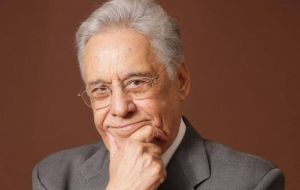MercoPress. South Atlantic News Agency
Brazil’s main October presidential battle will take place in Sao Paulo
 Challenger Neves and Dilma, who is seeking re-election, believe Sao Paulo’s voters are more up for grabs than they have been in decades
Challenger Neves and Dilma, who is seeking re-election, believe Sao Paulo’s voters are more up for grabs than they have been in decades  “It’s critical for us to recover our advantage in Sao Paulo” argues former president Cardoso and remains the PSDB’s honorary leader.
“It’s critical for us to recover our advantage in Sao Paulo” argues former president Cardoso and remains the PSDB’s honorary leader. When opposition party Senator Aecio Neves officially kicked off his presidential campaign last week, he posted a video on Facebook calling for a “fairer, more efficient, and more generous Brazil”. However the word ‘efficient’ struck some as an odd rallying cry in a tropical country known for its, well, un-Swiss-like approach to time.
But Neves’ campaign strategists say it was an overt appeal to voters in what looks like the most important battleground in October’s election: Sao Paulo, Brazil’s biggest city, whose residents tend to think of themselves as more business-like and buttoned-down than the rest of the nation.
With 20 million people in the metropolitan area, accounting for about a tenth of Brazil’s population and a much greater share of its wealth, Sao Paulo has always been a key source of votes and campaign financing.
This time, though, the stakes are higher. Both Neves and President Dilma Rousseff, who is seeking re-election, believe the city’s voters are more up for grabs than they have been in decades, and could verywell decide the winner nationwide.
Sao Paulo used to be a reliable bastion of Neves’ centrist Brazilian Social Democracy Party (PSDB). The party took the city and surrounding state, which has the same name, by five million votes when it last won a presidential election in 1998.
Since then, Rousseff’s left-leaning Workers’ Party has steadily eroded that advantage. She lost the state by just two million votes in a runoff for the presidency in 2010, and her party then won Sao Paulo’s mayorship in 2012, a high-profile office it previously held between 2001 and 2004.
A poll last month showed Rousseff with a four percentage-point advantage over Neves among voters in the metro area for this year’s election, on October 5. Nationwide, recent polls have given Rousseff a lead of about 15 to 18 percentage points.
But PSDB leaders believe that, despite their recent setbacks here, Sao Paulo’s large pool of relatively well-educated voters plus the city’s recent economic troubles make it their best opportunity to close the gap.
“It’s critical for us to recover our advantage here,” said Fernando Henrique Cardoso, who was president from 1995 to 2003 and remains the PSDB’s honorary leader. “Without it, a victory (for Neves) is probably difficult.”
That explains why Neves’ first official campaign event on July 6 saw him wearing an oriental-style yellow robe.
Neves believe he can beat Rousseff handily in Sao Paulo, especially if the election goes to a run-off vote between the two. Rousseff has also stepped up her appearances in the city, aiming to keep a lead here that could seal her re-election.
A look at Sao Paulo’s economy explains why Rousseff is leading — but also why the opposition thinks she’s vulnerable. Almost half of the city’s residents are members of Brazil’s so-called “C Class” — the group that was lifted out of poverty into the lower middle class during an economic boom last decade.
Poorer neighborhoods have seen many favela or shanty-towns replaced by more modern, brightly painted apartments. The number of cars in the city has doubled since 2001 as incomes rose. Many voters give the credit to Rousseff and her predecessor Lula da Silva, who governed from 2003 to 2010.
However, the city is hardly a slam-dunk for Rousseff. Only 23% of voters in Sao Paulo state, where the city is located, rated her government as “great” or “good” in a June poll by Datafolha — 10 points below the nationwide figure.
When the World Cup’s opening match was held in Sao Paulo last month, thousands of fans jeered and cursed Rousseff when video screens showed her image. The city was also the starting point for anti-government street protests.
Rousseff’s allies blamed both incidents on voters who were richer than the national average, and tend to vote PSDB. But Sao Paulo has been hit hard by the economic troubles that have characterized Rousseff’s presidency.
With growth stagnant for the past three years, the city’s industrial base has suffered and 96,000 factory workers were laid off in Greater Sao Paulo in the year through May.
Those still working have less spending power as prices rise at a 6.5% annual clip. Inflation hits harder in Sao Paulo than the national average because workers here tend to spend more of their income on services, where prices are increasing at about nine percent a year.
Cardoso says Neves can win votes in Sao Paulo by emphasizing the PSDB’s strong record against inflation — and by appealing to the city’s straight-laced self-identity.




Top Comments
Disclaimer & comment rules-

Read all comments“When the World Cup’s opening match was held in Sao Paulo last month, thousands of fans jeered and cursed Rousseff when video screens showed her image. The city was also the starting point for anti-government street protests. Rousseff’s allies blamed both incidents on voters who were richer than the national average, and tend to vote PSDB. But Sao Paulo has been hit hard by the economic troubles that have characterized Rousseff’s presidency”“.
Jul 17th, 2014 - 11:33 pm 0Dilma can blame who she wants for the above mentioned incident at the opening match, and for the street protests against her government, but what has become quite clear, is that she cannot fool the ”richer”, better educated portion of the population, concentrated in Sao Paulo. Up in the northeast, it's the opposite, they love her....why ?? because that's where 99% of the government handouts are concentrated....as long as the beneficiaries of handouts are allowed to vote, this is no more, no less, that officializing the practise of buying votes.
Commenting for this story is now closed.
If you have a Facebook account, become a fan and comment on our Facebook Page!